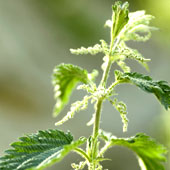|
Stinging Nettle
 General Information Stinging nettle is a perennial plant originally from Europe. It is now found throughout the United States and some parts of Canada. Stinging nettle supplements are made from the aerialaerialplant parts appearing above ground (above ground) parts of the plant. The shoots of the stinging nettle plant are rich in vitamin C and carotene. It also contains vitamin B complex and vitamin K. Common Name(s) stinging nettle, common nettle, urtica Scientific Name(s) Urtica dioica L.(Urticaceae) How is Stinging Nettle usually used? Stinging nettle is usually taken orallyorallyto be taken by mouth (swallowed). The plant has a high water content and so it is commonly available as a juice. The usual daily amount ranges from 15 mL to 45 mL, usually divided into 1 to 3 doses. Your health care provider may have recommended using this product in other ways. Contact a health care provider if you have questions. What is Stinging Nettle used for? People use stinging nettle in traditional herbal medicine:
Other conditions that stinging nettle has been used for include urinary tract infections and benign prostatic hyperplasia (BPH, an enlarged prostate). However, there is not enough evidence to support the use of stinging nettle for these conditions. Using stinging nettle as soon as allergy symptoms begin may help reduce some symptoms. However, it has not been shown to be an effective allergy treatment. Your health care provider may have recommended this product for other conditions. Contact a health care provider if you have questions. What else should I be aware of? Stinging nettle isconsidered safe for most adults when used in recommended doses for limited periods of time. Side effects of using stinging nettle include diarrhea, nausea, stomach upset, sweating, fever, headache, urinary tract infections, blood in the urine, urinary obstruction, and allergic reactions. Stinging nettle can be irritating when used on exposed skin. Stinging nettle should only be used occasionally as a diureticdiuretican agent that increases urine flow (an agent that increases urination). Due to stinging nettle's diuretic effect, it can slightly lower blood pressure in some people. Be careful about using stinging nettle with other medications or natural health products that lower blood pressure. Talk to a health care provider if the symptoms being treated persist or get worse. Stinging nettle may change your blood sugar levels, so be careful about using it if you have diabetes or are taking diabetic medications. You might need to monitor your blood sugar more frequently. Stinging nettle may increase your risk of bleeding. It needs to be used with care if you have a bleeding disorder or are taking medications that can increase the risk of bleeding. If you have diabetes, high blood pressure, bleeding disorders, gastrointestinal disorders, or reduced kidney function, consult your health care provider before taking stinging nettle. There may be an interaction between stinging nettle and the following:
Do not use stinging nettle if you are pregnant or breast-feeding or if you are under 12 years old. Before taking any new medications, including natural health products, speak to your physician, pharmacist, or other health care provider. Tell your health care provider about any natural health products you may be taking. Source(s)
Related conditions
Did you find what you were looking for on our website? Please let us know. |
|
|||||||||||||||||||||||||||||||||||||||||||||||||||||||||||||||||||||||||||||||||||||||||||||||||||||||||||||||||||||||||||||||||||||||||||||||||||||||||||||||||||||||||||||||||||||||||||||||||||||||||||||||||||||||||||||||||||||||||||||||||||||||||||||||||||||||||||||||||||||||||||||||||||||||||||||||||||||||||||||||||||||||||||||||||||||||||||||||||||||||||||||||||||||||||||||||||||||||||||||||||||||||||||||||||||||||||||||||||||||||||||||||||||||||||||||||||||||||||||||||||||||||||||||||||||||||||||||||||||||||||||||||||||||||||||||||||||||||||||||||||||||||||||||||||||||||||||||||||||||||||||||||||||||||||||||||||||||||||||||||||||||||
|
Hot Topics -
Bedwetting,
Depression,
Flu (Seasonal),
Healthy Skin,
Incontinence,
Multiple Sclerosis,
Psoriasis,
Stroke Risk Reduction
|
||
| Condition and disease information is written and reviewed by the MedBroadcast Clinical Team. |
||
|
|
The contents of this site are for informational purposes only and are meant to be discussed with your physician or other qualified health care professional before being acted on. Never disregard any advice given to you by your doctor or other qualified health care professional. Always seek the advice of a physician or other licensed health care professional regarding any questions you have about your medical condition(s) and treatment(s). This site is not a substitute for medical advice. © 1996 - 2024 MediResource Inc. - MediResource reaches millions of Canadians each year. |
|




